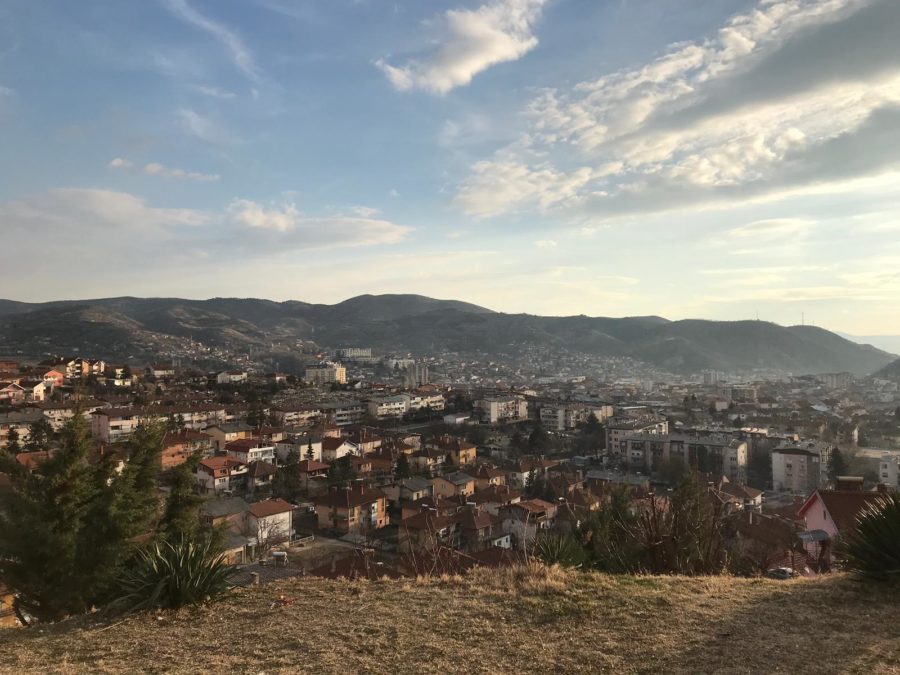One-hour drive from central to eastern North Macedonia, away from Skopje’s urban noise, you drive into a wide greenfield area full of agricultural land known as Ovche Pole. Its name in the Macedonian language means “plain of sheep” and it spreads left and right as a wide wave of green and wind. It is noted by Rebecca West in the famous “Black Lamb and Grey Falcon” describing her journey through Yugoslavia in the early 20th century.
I travelled to Shtip last week as part of my aim to get out of Skopje and meet people from different areas, to find out how life is outside of the capital and to see how the United Kingdom can work best with different partners across the country.
Shtip is a town in the eastern part of North Macedonia, known for the university it hosts, its textile factories, shoe production and as the home of famous Macedonian politicians from the country’s history. The mayor Blagoj Bocvarski was proud to inform me that Shtip was a centre of the eastern part of the country, has 50 000 inhabitants and is the home of several leaders among which are the first president of independent Macedonia Kiro Gligorov and the first Prime Minister Nikola Kljusev. His priority is infrastructure and his efforts can be seen in road construction, schools’ repairs, gasification, water and sewage systems investments and the milestone project – construction of a new kindergarten, at the cost of 930 000 euros which I saw when the mayor and I visited the construction site. The key message for me from this briefing was that if you invest in education and economy there will be better prospects for people and they would be less inclined to migrate, but instead will stay and innovate and contribute for their communities.
After the meeting the mayor took me to the multimedia centre Kiro Gligorov, in memory of the first president of independent Macedonia in the 1990s, native of Shtip. Macedonians are proud to say that Gligorov managed to get Macedonia at the time out of Yugoslavia without a war. The words “Macedonia is all we have” which is the title of Gligorov’s book are inscribed on the wall at the centre. A simple yet powerful message, considering the turbulent times this country has had.
I got the impression that Shtip was a vibrant town. The public university Goce Delcev is home to about 10 000 students and over 100 study programmes. I had an impressive meeting with the Chancellor Blazo Boev, and the two Vice-Chancellors Kiril Barabareev and Dejan Mirakovski, both of whom work on British Embassy supported programmes. Barbareev is one of the key experts that UNICEF uses for the character education programme and Mirakovski co-operates with the Institute for Communication Studies on the environment campaign. They gave me a crash course in the local economy and education challenges. Again, the key message was that young people seek their future abroad and that more collective work is needed in education reform. Education is a strong theme of the work that we do in North Macedonia so I hope in the future we will be able to expand the good British-Macedonian cooperation in this area.
Economy, engagement and decentralisation were the main themes in the conversations I had with media and civil society representatives later in the day. One of my hosts was Goran Gavrilov and his team at Kanal 77 who gave me excellent insight into the media environment, how a radio station operates and the challenges that local vs national media face in the country. Added value to the briefing was the insight in local customs and foods that they presented me.
The last meeting of the day was with the local civil society organisations hosted by the resource centre for civil society organisations. I am really grateful to Dina, the coordinator of the centre who organised this meeting. It was a unique and extraordinary opportunity for me to hear what the challenges were for the civil society sector outside of Skopje. The key message again was economy and engagement: improved economy would lead to less migration, retaining people and developing the capacities of the organisations on local level. Engagement was key – from central government and also from donors as we all need to get out and about if we really want to explore what is the difference we can make to the people in diverse regions of the country and to find out what are the real everyday challenges, so that our programmes can substantially support them.
My offsite programme included a short sightseeing in Shtip with the traditional shoe-shopping. On my way back to Skopje the sun was setting as we drove through the wide and endless Ovche Pole. We stopped to take photos of the landscape, the wind almost swept me off my feet, so did the view.

